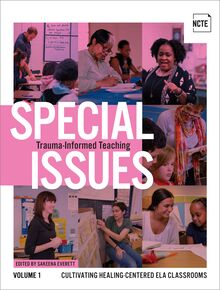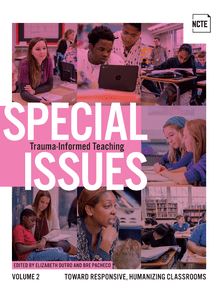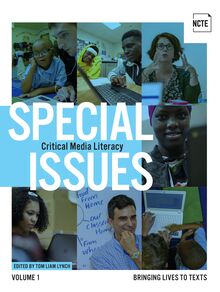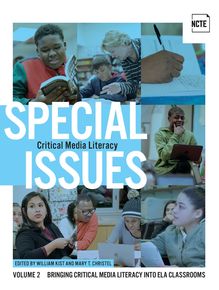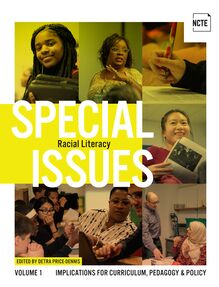Special Issues, Volume 1: Trauma-Informed Teaching , livre ebook
206
pages
English
Ebooks
2021
Vous pourrez modifier la taille du texte de cet ouvrage
Obtenez un accès à la bibliothèque pour le consulter en ligne En savoir plus
Découvre YouScribe en t'inscrivant gratuitement
Découvre YouScribe en t'inscrivant gratuitement
206
pages
English
Ebooks
2021
Vous pourrez modifier la taille du texte de cet ouvrage
Obtenez un accès à la bibliothèque pour le consulter en ligne En savoir plus
Date de parution
10 décembre 2021
Nombre de lectures
1
EAN13
9780814100127
Langue
English
Poids de l'ouvrage
1 Mo
This first volume of Special Issues: Trauma-Informed Teaching gathers some of the most compelling and practical recent articles across NCTE journals, addressing the importance of trauma-informed teaching and its recent developments in the field.
We live in a time that requires attention to trauma. Educators and students are learning how to move forward in this precarious time, which in many ways has amplified preexisting health, racial, economic, and educational inequalities. The pandemic has shaped us in ways we have yet to understand fully, but we know we must adapt and heal together. It is imperative that K-College educators not only consider trauma-informed teaching, but also healing-centered teaching practices. As we think through ways to support the most harmed people in our teaching and learning communities, we will move closer to a more equitable and just healing-centered profession.
Editor Sakeena Everett has curated this collection to show how to help K-College teachers integrate the most up-to-date approaches to trauma-informed teaching into their classroom environments. In this volume, you will find valuable insights, diverse perspectives, innovative and exciting pedagogies, as well as thought-provoking research methodologies that engage micro- and macro-level supports you need to get started today.
About the Special Issue series:
Most teachers and students across the country are grappling with several important issues. We hear from many educators who are looking for compelling and engaging approaches racial literacy, critical media literacy, and trauma-informed teaching.
NCTE is responding to these needs with Special Issues, a series of books designed to directly address these pressing topics in K-12 and college classrooms today. The first volumes collect content on these topics from across all of NCTE’s journals in one place, to make the most relevant material accessible and practical.
Edited by expert practitioners in the field, each volume contains teaching tips to help implement these approaches in classrooms.
Date de parution
10 décembre 2021
Nombre de lectures
1
EAN13
9780814100127
Langue
English
Poids de l'ouvrage
1 Mo
TITLES IN THE SERIES
CRITICAL MEDIA LITERACY
Vol. 1: Bringing Lives to Texts
RACIAL LITERACY
Vol. 1: Implications for Curriculum, Pedagogy, & Policy
TRAUMA-INFORMED TEACHING”
Vol. 1: Cultivating Healing-Centered ELA Classrooms
Editor: Sakeena Everett Series editor: James Sitar Cover and interior design: Ash Goodwin Cover images: Marvin Young Typesetter: Jim Gallagher
ISBN: 978-0-8141-4494-7 elSBN: 978-0-8141-4495-4
© 2021 by the National Council of Teachers of English.
All rights reserved. No part of this publication may be reproduced or transmitted in any form or by any means, electronic or mechanical, including photocopy, or any information storage and retrieval system, without permission from the copyright holder. Printed in the United States of America.
It is the policy of NCTE in its journals and other publications to provide a forum for the open discussion of ideas concerning the content and the teaching of English and the language arts. Publicity accorded to any particular point of view does not imply endorsement by the Executive Committee, the Board of Directors, or the membership at large, except in announcements of policy where such endorsement is clearly specified.
NCTE provides equal employment opportunity to all staff members and applicants for employment without regard to race, color, religion, sex, national origin, age, physical, mental or perceived handicap/disability, sexual orientation including gender identity or expression, ancestry, genetic information, marital status, military status, unfavorable discharge from military service, pregnancy, citizenship status, personal appearance, matriculation or political affiliation, or any other protected status under applicable federal, state, and local laws.
Every effort has been made to provide current URLs and email addresses, but, because of the rapidly changing nature of the web, some sites and addresses may no longer be accessible.
Library of Congress Cataloging-in-Publication Data applied for.
NCTE 340 N. Neil Street, Suite 104 | Champaign, IL 61820 www.ncte.org
VOLUME 1 TRAUMA-INFORMED TEACHING
CULTIVATING HEALING-CENTERED ELA CLASSROOMS
09 Editor's Introduction
SAKEENA EVERETT
NAVIGATING PANDEMIC-SPECIFIC TRAUMA
13 A School Is Not Meant to be Empty (poem)
JULENE WAFFLE
14 Counterstorytelling This Historical Moment
KEISHA L. GREEN
17 Pandemic Pages
LISA MATISON GARRIGUES
20 Culture, Loss, and Silence: It's on Us
PENNY KITTLE
24 From Crisis to Continuity: The Role of the LMS in the Future of Learning
SARA PAZUR
28 Writing for Liberation
TIANA SILVAS
31 In the Black Radical Tradition: Poetry as a Praxis for Healing and Resistance in Education
GWENDOLYN BAXLEY & YOLANDA SEALEY-RUIZ
38 Pedagogies of Complicity: Perspective Taking and Healing
ANTERO GARCIA
42 Opportunity Centered Teaching for Racial Justice in Elementary English Language Arts Classrooms
H.RICHARD MILNER IV, JALEEL HOWARD, TEQUI LA CORNELIOUS, BRYANT O. BEST & LAURA FITTZ
50 What's in a Name? Language, Identity, and Power in English Education
GRACE MYHYUN KIM
NUANCING THE DIVERSE SPECTRUM OF TRAUMA
55 In Dialogue: Transnational Childhoods
MARILISA JIMÉNEZ GARCÍA, FIKILE NXUMALO & LEILANI SABZALIAN
61 The Kid in the Back of the Class
AISHA SAEED
65 From Rapport to Relationships: Shifting Our Practice from Classroom Management to Community
MATTHEW HOMRICH-KNIELING
69 Access Fatigue: The Rhetorical Work of Disability in Everyday Life
ANNIKA M. KONRAD
82 Addressing Homelessness in Our Schools and Language Arts Classrooms
THERESA ROGERS & ROWAN SHAFER
93 There's Hope for Us All: Transformative Moments
HEIDI LYN HADLEY
96 Texts of Becoming: A Parent's Plea for the Inclusion of Trans* Narratives
ANONYMOUS
99 Trauma-Informed Writing Pedagogy: Ways to Support Student Writers Affected by Trauma and Traumatic Stress
MELISSA TAYLES
BUILDING HEALING-CENTERED EU PEDAGOGIES
112 Latinx Mothers and Daughters Defining Themselves through Art and Writing
TRACEY T. FLORES
119 Harm and Healing: Reading with an ABAR (Anti-Bias, Antiracist) Lens
ELIZA RAMIREZ & SARAH J.DONOVAN
125 #TeenPoetsMatter: Writing Critical Micropoems as Urban Social Critiques
JEVON DELEXANDER HUNTER & GLISET COLÓN
133 Shining Light in Dark Corners: Choosing Heavy Books for the Classroom
JESSICA GALLO & BAILEY HERRMANN
138 Enhancing Students’ Mental Health Literacy through the Paratext of Two Middle-Level Novels
BROOKE B. EISENBACH & PAULA GREATHOUSE
141 Using Picturebooks to Teach with and against Social and Emotional Learning
CAROLINE T. CLARK, ALYSSA CHRISMAN & SUZANNE G. LEWIS
154 Design Thinking in Reading Workshop: Flexible Strategies for Sparking Empathy in Middle Readers in the Time of COVID-19
KATIE DURKIN
SUPPORTING HURTING EDUCATORS
161 I Don't Want to Write a Poem for My Dead Students (poem)
ZACH CZAIA
162 “Death didn't come up at center time”: Sharing Books about Grief in Elementary Literacy Classrooms
NICHOLAS E. HUSBYE, BETH A. BUCHHOLZ, CHRISTY WESSEL POWELL & SARAH VANDER ZANDEN
173 When Teachers Hurt: Supporting Preservice Teacher Well-Being
MANDIE B. DUNN
177 Creating Space for Grief: Cultivating an Intersectional Grief-Informed Systemic Pathway for Teacher Leaders
SAKEENA EVERETT & MANDIE BEVELS DUNN
182 Call for Manuscripts: Volume 2
EDITOR'S INTRODUCTION
SAKEENA EVERETT
WE LIVE IN A TIME that requires attention to trauma. Educators and students are learning how to live in this precarious COVID-19 pandemic, which has amplified preexisting health, racial, economic, and educational inequalities as well as how we manage unprecedented natural disasters. The pandemic has shaped us and our students in ways we have yet to understand fully. But we know we must adapt. In an effort to respond to pressing teaching and learning needs, I was asked to curate this special issue on trauma-informed teaching. Specifically, I have been tasked with selecting previously published articles from NCTE journals to help educators implement trauma-informed teaching approaches in K-12 and college classrooms while offering tips for how these articles can be incorporated into our classrooms. In my research for this volume, I learned it is imperative to not only consider trauma-informed, but also healing-centered teaching practices. This collection is a useful starting point—not ending point-to spark conversation, evoke deep internal and external reflection, and engage strategic pathways forward.
Contextualizing Trauma, Trauma-Informed Care, and Trauma-Informed Teaching
Adverse childhood experiences (ACEs) are potentially traumatic events that occur in childhood. ACEs can include violence, abuse, and growing up in a family with mental health or substance abuse problems (CDC Vital Signs, 2019). The Centers for Disease Control and Prevention (CDC) also argues that ACEs are linked to chronic health problems, mental illness, and substance misuse in adulthood. With ACEs in mind, it is important to explain how I use the terms trauma and trauma-informed to explain my approach for curating this special issue. My understandings of trauma draw from applied clinical scholarship, which explains that
trauma is the result of an event, series of events, or set of circumstances that is experienced by an individual as physically or emotionally harmful or life threatening and that has lasting adverse effects on the individual's functioning and mental, physical, social, emotional, or spiritual well-being. (Substance Abuse and Mental Health Services Administration, 2015)
The Substance Abuse and Mental Health Services Administration (SAMHSA) is the governmental agency within the US Department of Health and Human Services that leads public behavioral health efforts. SAMSHA's mission is to reduce the impact of substance abuse and mental illness on America's communities. Furthermore, trauma-informed care “views trauma through an ecological and cultural lens and recognizes that context plays a significant role in how individuals perceive and process traumatic events.” Trauma-informed care involves vigilance in anticipating and avoiding institutional processes and individual practices that are likely to retraumatize individuals who already have histories of trauma (SAMHSA, 2015). Informed by clinical understandings of trauma, I define trauma-informed teaching as teaching that views trauma through ecological and cultural lenses and recognizes how context plays a significant role in how students and teachers perceive and process traumatic events in educational settings.
Neighborhoods and student populations in the United States are largely clustered by racial and ethnic groups. So are rates of exposure to trauma-inducing events and experiences. Yet, trauma may be one of the most underexplored racial equity issues in education (Alvarez, 2020). Trauma can be natural or human-caused. Natural events are typically unavoidable, whereas human-caused traumas are caused by human failure (e.g., technological catastrophes, accidents, malevolence) or by human design (SAM-HSA, 2015). The effects of human-caused historical trauma— such as genocide, slavery, and internment in concentration camps—can be felt across generations. People's stories, coping behaviors, and stress reactions can be passed across generational lines far removed from the actual event(s) or firsthand accounts.
To effectively engage in trauma-informed teaching, educators must thoughtfully consider the ecological, cultural, and racialized realities that shape exposure to traumatic events. These articles are meant to provide educators with a set of tools to help anticipate and avoid institutional processes and individual practices that are likely to retrauma-tize students who already have individual, collective, and/or historical trauma histories.
A Brief Snapshot of Prepandemic Trauma in the US
Millions of young people in grade school and college are processing trauma. Approximate
